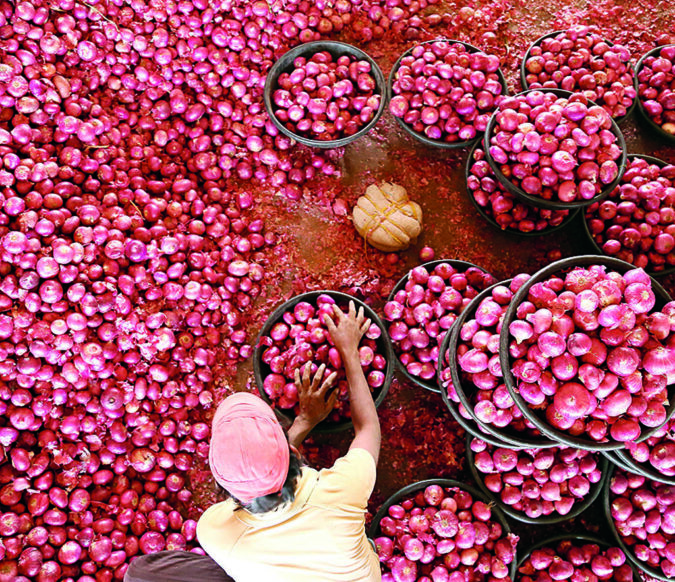Lalaine Basa would buy a kilo of onions to make spring rolls at her catering business north of Manila. She’s now changed her recipe to use half the amount because of soaring prices in the Philippines. In the Moroccan capital Rabat, Fatima no longer buys onions and tomatoes because they are too expensive. She gets artichokes to cook tagine instead.
The experiences of the two women over 12,000km apart shows how the global crisis over food supplies is taking an alarming twist: threatening to consume ingredients critical to the world’s nutrition. The costs of wheat and grains have fallen in recent months, easing concern over access to some staples. But a combination of factors is now shaking up the vegetable market. And at the sharp end of that is the humble onion.
Prices are soaring, fueling inflation. Morocco and Turkey have halted some exports, as has Kazakhstan. The Philippines has ordered an investigation into cartels.
Restrictions have also gone beyond onions to include carrots, tomatoes, potatoes and apples, hampering availability worldwide, the UN and the World Bank warned this month. In Europe, empty shelves have forced UK supermarkets to ration purchases of some fruit and vegetables after a weak harvest in Spain and North Africa.
The jump in prices is a knock-on effect from disastrous floods in Pakistan, frosts damaging stockpiles in Central Asia and Russia’s war in Ukraine. In North Africa, meanwhile, farmers have battled severe droughts and an increase in the cost of seeds and fertilisers.
Poor weather has hit Moroccan growers hard. In Rabat, vegetable prices remain “exuberantly high” even with the ban on sending onions and tomatoes to West Africa introduced by the government this month.
In the Philippines, a dearth of onions has compounded shortages of everything from salt to sugar. Prices became so absurdly high that they briefly cost more than meat, while flight attendants were caught smuggling them out of West Asia. The government has boosted imports to tame the highest inflation in 14 years.
In Kazakhstan, the spike in prices has prompted authorities to tap strategic stockpiles. That’s on top of an export ban, also introduced by Kyrgyzstan, Uzbekistan and Tajikistan. Elsewhere, Azerbaijan is putting “limit” on sales and Belarus will licence shipments.
As the cost of buying nutrient-rich vegetables and fruit soars and incomes struggle to keep up, healthy diets are getting out of reach. Over 3 billion people cannot afford a healthy diet, UN figures show. That will rise up the political agenda globally, and nutrition will be a much more prominent part of government thinking, said Tim Benton, research director in emerging risks at Chatham House in London. He calls it a “nutrition time bomb” that’s exploding slowly.
The experiences of the two women over 12,000km apart shows how the global crisis over food supplies is taking an alarming twist: threatening to consume ingredients critical to the world’s nutrition. The costs of wheat and grains have fallen in recent months, easing concern over access to some staples. But a combination of factors is now shaking up the vegetable market. And at the sharp end of that is the humble onion.
Prices are soaring, fueling inflation. Morocco and Turkey have halted some exports, as has Kazakhstan. The Philippines has ordered an investigation into cartels.
Restrictions have also gone beyond onions to include carrots, tomatoes, potatoes and apples, hampering availability worldwide, the UN and the World Bank warned this month. In Europe, empty shelves have forced UK supermarkets to ration purchases of some fruit and vegetables after a weak harvest in Spain and North Africa.
The jump in prices is a knock-on effect from disastrous floods in Pakistan, frosts damaging stockpiles in Central Asia and Russia’s war in Ukraine. In North Africa, meanwhile, farmers have battled severe droughts and an increase in the cost of seeds and fertilisers.
Poor weather has hit Moroccan growers hard. In Rabat, vegetable prices remain “exuberantly high” even with the ban on sending onions and tomatoes to West Africa introduced by the government this month.
In the Philippines, a dearth of onions has compounded shortages of everything from salt to sugar. Prices became so absurdly high that they briefly cost more than meat, while flight attendants were caught smuggling them out of West Asia. The government has boosted imports to tame the highest inflation in 14 years.
In Kazakhstan, the spike in prices has prompted authorities to tap strategic stockpiles. That’s on top of an export ban, also introduced by Kyrgyzstan, Uzbekistan and Tajikistan. Elsewhere, Azerbaijan is putting “limit” on sales and Belarus will licence shipments.
As the cost of buying nutrient-rich vegetables and fruit soars and incomes struggle to keep up, healthy diets are getting out of reach. Over 3 billion people cannot afford a healthy diet, UN figures show. That will rise up the political agenda globally, and nutrition will be a much more prominent part of government thinking, said Tim Benton, research director in emerging risks at Chatham House in London. He calls it a “nutrition time bomb” that’s exploding slowly.
